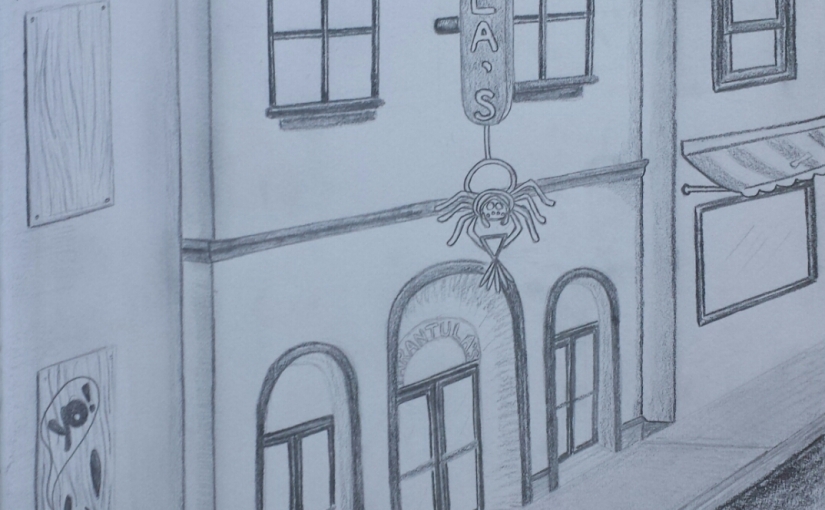I’ve seen a lot through the years, lost friends, some even saying their final goodbyes while weeping in front of my gun, but I can tell you right now, there aren’t very many things that’ll stick with you the way choking near to death on your own blood will, but I had a long life before that scum-sucker Bullet Hands decked me to pieces.
I was born “John Peter Minacelli”, just outside of Slate City, in an area known as Pearwood. My mother was your typical, old school, Sicilian homemaker, and I’ll be the first to admit that she spoiled us rotten, not that we didn’t occasionally catch a wooden spoon or two to the temple when we made the mistake of getting a little mouthy with the old lady. My father though, he was part of something altogether different, yet he and his buddies made certain never to acknowledge exactly what that was around us kids, offering no more than the vague explanation that he was a dedicated member of – as he’d put it – “This thing of ours”. However cryptic my father chose to be, I was the oldest of three kids, and the only boy, so Sicilian tradition dictated that it would only be a matter of time before I’d be a part of it too.
After proving throughout the entirety of grammar school that I wasn’t worth a damn academically, and that I certainly didn’t seem to be responding at all to my father’s nightly belt lashings meant to steer me straight, the school attempted to hold me back a grade, so I dropped out and began running packages for my Uncle Giuseppe Francis Minacelli down at his diner. Without realizing that I had actually started to infiltrate my father’s business, I quickly began to rise through the ranks of one of America’s most notorious criminal organizations: La Cosa Nostra, or as it is more commonly known, the American Mafia.
Within the first year, I had graduated from running packages to torching trucks under Slate City’s so-called Cheesecake Bridge. The older guys who’d come to drop off the trucks – most of which I’d met as family friends during my childhood – instructed me, with the frostiest of stares, never to look inside the vehicles before I lit them up, but I don’t think I need to tell you that little Johnny Minacelli was never one for following orders.
Late one Saturday, while my old friends from the neighborhood were busy trolling for chicks downtown, an unusually dirty Giuseppe Minacelli came cruising into my burn pit with an old 1974 Mago Ironclad, a dream car for the teenage me. After soaking a monogrammed handkerchief a couple times through with the sweat from his forehead, my uncle flung the keys into my chest, told me to make sure no one ever saw even so much as a fan belt from the thing again, and hobbled off into the shadows where another car picked him up and sped off back into the city. As much as I wanted to follow the orders – that job was the first thing I ever really enjoyed doing – my need to plant my ass behind the wheel of that beautiful machine was overwhelming, so I waited til his car disappeared behind a set of abandoned row homes, fired up the six-cylinder, and peeled wheels into the night.
Up until that moment, I’d never had access to a vehicle like that. I’d lost my driver’s license before I even had it after stealing my first girlfriend’s sister’s car, and ramming it through the plate glass face of the junior high’s cafeteria. So it should come as no surprise that when I finally got my hands on one of the western world’s most iconic muscle cars, I wasn’t exactly trying to joyride inconspicuously. Somewhere up near 32nd street, I dropped my cigarette, and swerved just enough while trying to fish it out from under the seat to catch the attention of a passing patrol car. Sat in a stolen car, with no license, and a last name that almost every cop on the Eastern seaboard knew well to look out for, it took very little time for me to be cuffed, plopped down on the curb, and my car thoroughly searched. Once they caught sight of what my Uncle had always warned me not to go searching in the stolen vehicles for, I was arrested and immediately charged with the murder of the State’s witness they found shot, stabbed, and bundled up in the trunk.
Ten long years I sat there in prison, no cars, no girls, no money, nothing. My uncle knew exactly what was in that car, and that meant my father did too, but they dropped it on me anyway, let me take the life sentence. All that time inside changed little Johnny Minacelli though, helped me become the man neither of those jerk-offs ever were. I took to studying law every chance I got, even swiped a few books about forensic testing, and the related legislation from the library, and kept them stashed inside my seemingly gravel-stuffed mattress. Eventually I managed to file the necessary appeals to the Supreme Court, and was provided a public defender that a few intimidating words about my familial connections ensured would do everything in their power to see my conviction overturned. Two years later I was a free man, twenty nine years old, wearing the same outdated suit I’d borrowed from my Uncle years before, but with a brand new head twisted onto my shoulders, one that not only carried the best damn pompadour money could buy, but the most cold-blooded and foolproof revenge scheme the world would ever know.
In the decade that’d passed since my incarceration, the bulk of the Minacelli family’s criminal enterprise had been shifted away from waste management – and the obligatory hit – to a series of high-stakes hijacking operations targeting freight trucks that were deployed by a cousin of mine who’d agreed to allow the occasional cargo load to “disappear” for the sake of the family’s financial interest. I knew right from the get-go that my cousin had been positioned deliberately to act as the family’s next fall guy; if any of the local police caught wind of the stolen freight, he’d be the one facing the charges, just as I had before, and he’d be the one sitting in that hellhole of a prison. Considering how deeply screwed he’d already allowed himself to get, I had no problem putting a few rounds in the back of his head that night I broke into his warehouse; the bullets would be coming from one direction, by the hand of some other member of our extended “family” soon enough anyway. Besides, he was a means to an end, and that end was one I was not willing to allow his continuously valueless life to obstruct. In the business, we call that collateral damage.
I stuffed my cousin’s body in a corner behind his cluttered desk, wiped the pistol down, and tucked it into his palm, carefully placing the barrel in as convincing a position as possible as to imply that he might have just shot himself. From there, I flipped on his CB radio, and began to listen for the call of my Uncle’s men; a little espionage told me that this was how they communicated with the warehouse, and that there was to be a meeting of sorts that night. About an hour and a half later, the call came through, and within fifteen minutes, my uncle Giuseppe, my father, and three other high-ranking members of the Minacelli crime family were sauntering on through the massive loading bay door into the darkened warehouse.
Though I’d hit most of the lights after whacking my cousin, I made sure to leave the one in his office burning bright; this was the cheese on my rat trap, if you will. As expected, the men made their way across the building, and pushed open the door of my cousin’s office to find him tucked-up like a forgotten rag doll, soaking in blood in the corner.
“Ricky!” screamed my Uncle, Ricky’s father, “Those Fradlianni bastards hit Ricky”!
“ No damn way,” I heard my father say, “we’ve got a deal with them, this had to be the cops”.
I dream nightly of the looks on their faces when I flicked the eighteen-wheeler’s headlights on, and flooded the tiny office with a halogen blast. I yanked the chain hanging near my head, and sounded a mighty horn that almost knocked the group of them onto their asses.
“Hiya pops!” I yelled, hanging out the driver’s side window, before I slammed the accelerator to the floor, and drove that truck straight through the open bay door, into that dingy little office, and right over top of my scumbag “family”.
Somehow my father managed to survive the initial impact, and when I walked around to the mess of concrete, glass, and flesh at the front of the truck, he coughed up a nice, black wad of blood, and cursed me through his broken teeth.
“You always were shit, boy,” he told me, “I knew you’d never amount to nothing, but I never thought you’d tear the whole family down”.
“Tear it down?” I said, “Nah Pops, we‘re about to be bigger than you ever imagined”.
I muffled his final words with a nearby oil rag, and put two bullets between his eyes.
The king was dead. Long live little Johnny Minacelli.
[To be continued]
Copyright Wonder Void Studios 2019
Thanks for taking the time to read yet another epic chapter in my ongoing sci-fi/fantasy serial Kika Gumi and the Prism Cult. I really hope you enjoyed the tale, make sure to come right back here every Tuesday for new pages. Be sure to follow so you don’t miss this, or any of our exciting upcoming releases. Follow me on Twitter @ItsMrGChris for all sorts of flash fiction, and related literary material. Thanks again for your continued support, I’ll see you next time!



